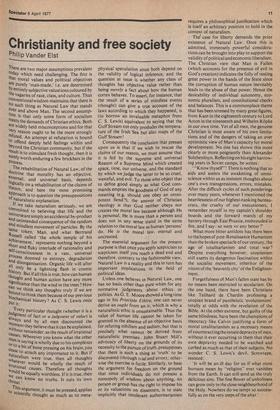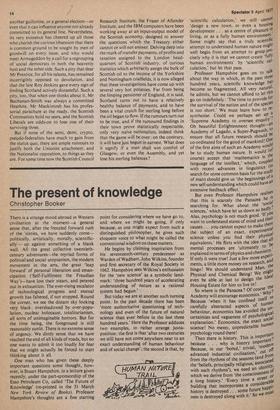Christianity and free society
Philip Vander Elst
There are two major assumptions prevalent today which need challenging. The first is that moral values and political objectives
are Purely 'man-made,' i.e. are determined by entirely subjective valuations coloured by the vagaries of race, class, and culture. Thus
conventional wisdom maintains that there is no such thing as Natural Law that stands over and above Man. The second assumption is that only some form of socialism meets the demands of Christian ethics. Both are Widely held misconceptions and for that very reason ought to be the more strongly refuted. An attempt at refutation is bound to Wend deeply held feelings within and beYOnd the Christian community, but if the result is to stimulate fresh thought, then it is surely worth enduring a few brickbats in the Process.
The rehabilitation of Natural Law, of the doctrine that morality has an objective, external, and universal basis, depends logically on a rehabilitation of the claims of theism. and here the most promising approach is to question the presuppositions of naturalistic explanation. If we take naturalism seriously, we are committed to believing that life and the universe are simply an accidental by-product and unintended consequence of the random and mindless movement or particles. By the same token, Man, and what Bertrand Russell called 'the whole temple of his achievement,' represents nothing beyond a Short and fluky interlude of rationality and self-consciousness in a vast, universal Process doomed to entropy, degradation and disorganisation. Organic life will after 41,;11 only be a lightning flash in cosmic ,n,"story. But if all this is true, how can human `nought and human action have any more significance than the wind in the trees? How c, an we think any thoughts truly if we are _09 Lind to think them because of oui previous biochemical history ? As C. S. Lewis once Put it 4Every particular thought (whether it is a Judgment of fact or a judgment of value) is always and by all men discounted the Moment they believe that it can be explained, without remainder, as the result of irrational causes. Whenever you know what the other Man is saying is wholly due to his complexes or to a bit of bone pressing on his brain, you cease to attach any importance to it. But if naturalism were true, then all thoughts Whatever would be wholly the result of lrational causes. Therefore all thoughts Would be equally worthless. If it is true, then We can know no truths. It cuts its own throat.'
This argument, it must be stressed,applies '° scientific thought as much as to meta physical speculation since both depend on the validity of logical inference, and the question at issue is whether any class of thoughts has objective value rather than being merely a fact about how the human cortex behaves. To assert, for instance, that the result of a series of mindless events (thought) can give a true account of the laws according to which they happened, is (to borrow an invaluable metaphor from C. S. Lewis) equivalent to saying that the Gulf Stream not only produdes the temperature of the Irish Sea but also maps of the Gulf Stream!
Consequently the conclusion that presses upon us is that if we wish to rescue the claims of our reason, we must assume that it is fed by the supreme and universal Reason of a Supreme Mind which created space, time, our universe, and the standard by which we judge the latter to be so cruel, wasteful, and evil. To those who object that to define good simply as what God commands empties the goodness of God of any meaning (e.g. should one obey an omnipotent fiend?), the answer of Christian theology is that God neither obeys nor creates the moral law because although He is personal, He is more than a person and does not in any sense stand in the same relation to the moi al law as human 'persons' do. He is the moral law, eternal and uncreated.
The essential argument for the present purpose is that once you apply scepticism to scepticism itself you reach a dead end and therefore, contrary to the fashionable view, Natural Law is a reality and this in turn has important implications in the field of political ideas.
Unless one believes in Natural Law, one has no basis other than pure whim for any normative judgments about ethics or politics. As G. E. Moore showed a long time ago in his Principia Ethica, one can never derive an ought from an is, which is why a naturalistic ethic is unsustainable. Thus the value of human life cannot be taken for granted in the absence of an objective basis for refuting nihilism and sadism, but that is precisely what cannot be derived from naturalistic premises. John Stuart Mill's advocacy of liberty on the grounds of its necessity to the pursuit of truth, presupposes that there is such a thing as 'truth' to be discovered (through ti ial and error); otherwise the exercise is futile. Similarly, to base the argument for freedom on the ground that since individuals do not possess a monopoly of wisdom about anything, no person or group has the right to impose his or its valuations on dissenters, is to state implicitly that intolerant authoritarianism
requires a philosophical justification which is itself an arbitrary position to hold in the context of naturalism.
The' case for liberty demands the prior existence of Natural Law. Once this is admitted, immensely powerful considerations can be brought into play to support the validity of political and economic liberalism. The Christian view that Man is Fallen (which accounts for the presence of evil in God's creation) indicates the folly of vesting great power in the hands of the State since the corruption of human nature inevitably leads to the abuse of that power. Hence the desirability of individual autonomy, economic pluralism, and constitutional checks and balances. This is a commonplace theme that has been stressed by many great figures, from Kant in the eighteenth century to Lord Acton in the nineteenth and Wilhelm Ropke in our own time. Yet of all men, the genuine Christian is most aware of his own limitations and of the dangers of taking an over optimistic view of Man's capacity for moral development. No one has shown this more clearly ot more poignantly than Alexander Solzhenitsyn. Reflecting on his eight harrowing years in Soviet camps, he writes:
—Know thyself"! There is nothing that so aids and assists the awakening of omniscience within us as insistent thoughts about one's own transgressions, errors, mistakes. After the difficult cycles of such ponderings over many years, whenever I mentioned the heartlessness of our highest-ranking bureaucrats, the cruelty of our executioners, I remember myself in my captain's shoulder boards and the forward march of my battery through East Prussia, enshrouded in fire, and I say : so were we any better ?'
What more bitter antidote has there been to the hopesof post-Renaissance Humanism than the broken spectacle of our century, the age of totalitarianism and total war? Despite everything however, utopianism still exerts its dangerous fascination within the socialist movement, inheritor of the vision of the 'heavenly city' of the Enlightenment.
Forgetfulness of Man's fallen state has by no means been restricted to secularism. On the one hand, there have been Christians like Teilhard de Chardin professing a utopian brand of pantheistic 'evolutionism' totally at odds with the revelation of the Bible. At the other extreme, but guilty of the same blindness, have been the champions of theocracy like Calvin justifying a form of moral totalitarianism as a necessary means of counteracting the innate depravity of men, without it ever occurring to them that their own depravity needed to be watched and curbed as much as that of their subjects. No wonder C. S. Lewis's devil, Screwtape, insisted:
'It will be an ill day for us if what most humans mean by -religion" ever vanishes
from the Earth. It can still send us the truly delicious sins. The fine flower of unholiness can grow only in the close neighbourhood of the Holy. Nowhere do we tempt so successfully as on the very steps of the altar.' another guillotine, or a general election—or even that it can influence anyone not already committed to its general line. Nevertheless, its very existence has cheered up all those who cherish the curious obsession that there is common ground to be sought by men of goodwill on every issue, and who would meet Armageddon by a call for a regrouping of 'social democrats in both the heavenly host and the other side. Such a pity that dear Mr Prentice. for all his talents, has remained incorrigibly opposed to devolution, and that the late Roy Jenkins gave every sign of finding Scotland actively distasteful. Such a pity, too, that when one thinks about it, Mr Buchanan-Smith was always a committed Heathite, Mr Mackintosh has his professorial parachute at the ready, the Scottish Communists hold no seats, and the Scottish Liberals are odds-on to lose one of their surviving three.
But if none of the semi, demi, crypto, pseudo-federalists have much to gain from the status quo, there are ample rumours to justify both the Unionist attachment, and the Nationalist opposition, to things as they are. For some time now the Scottish Council
Research Institute, the Fraser of Allander Institute, and the IBM computers have been working away at an input-output model of the Scottish economy, designed to answer the questions which the Treasury either cannot or will not answer. Delving deep into the murk of transfer payments, of profits and taxation assigned to the London headquarters of Scottish industry, of curious statistics which arbitrarily assign the bulk of Scottish oil to the income of the Yorkshire and Nottingham coalfields, it is now alleged that these investigations have come up with several very hot potatoes. Far from being the limping pensioner of England, it is said. Scotland turns out to have a relatively healthy balance of payments, and to have been a vital crutch for sterling long before the oil began to flow. If the rumours turn out to be true, and if the rumoured findings in their town prove statistically respectable, only very naïve nationalists, indeed think that the game will be over: on the contrary, it.wi 11 have just begun in earnest. What does it signify if a man shall win control of Glasgow, or even the Assembly, and yet lose his sterling balances?

































 Previous page
Previous page